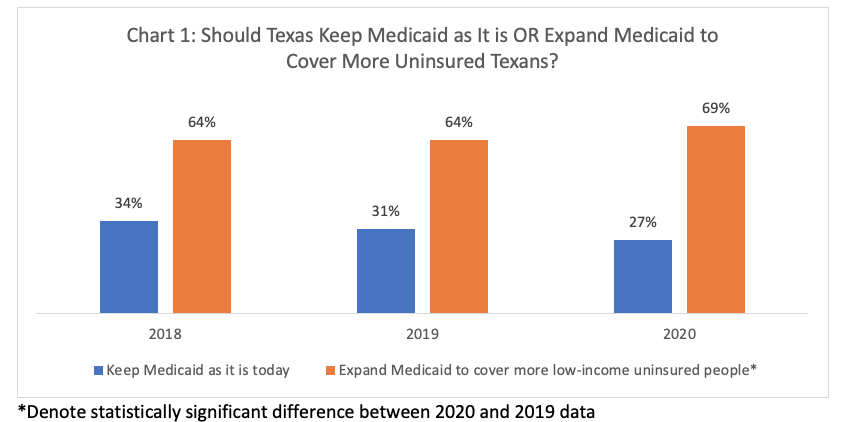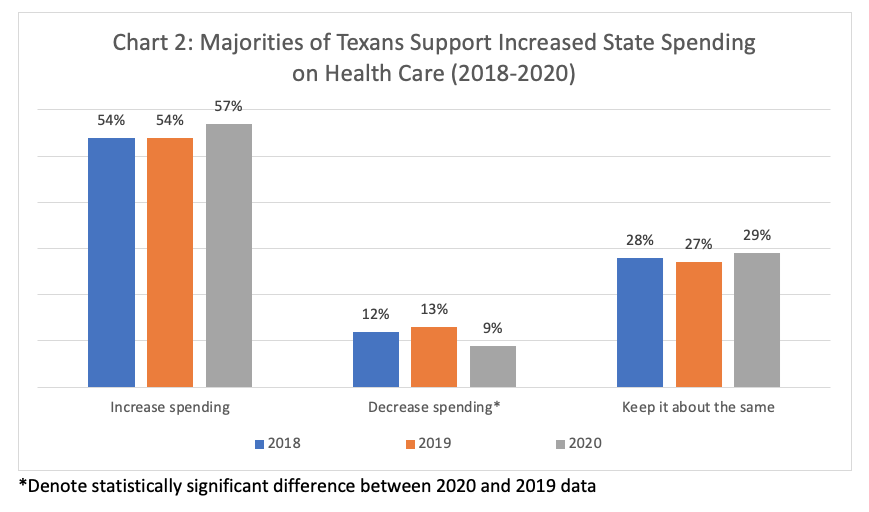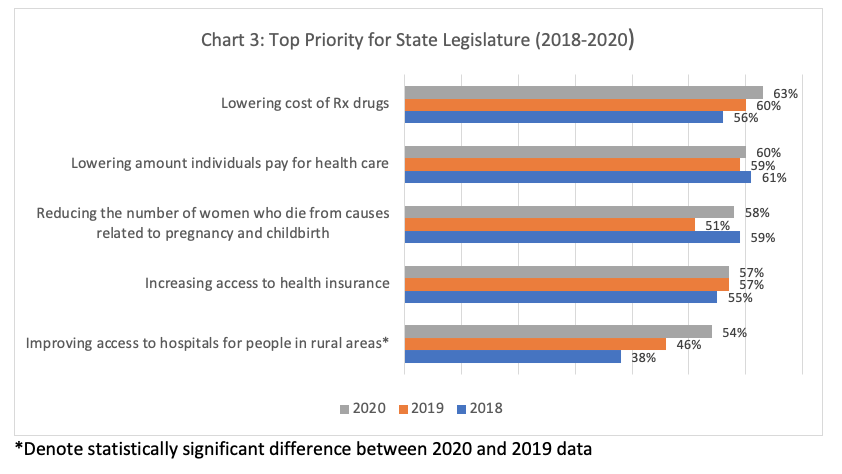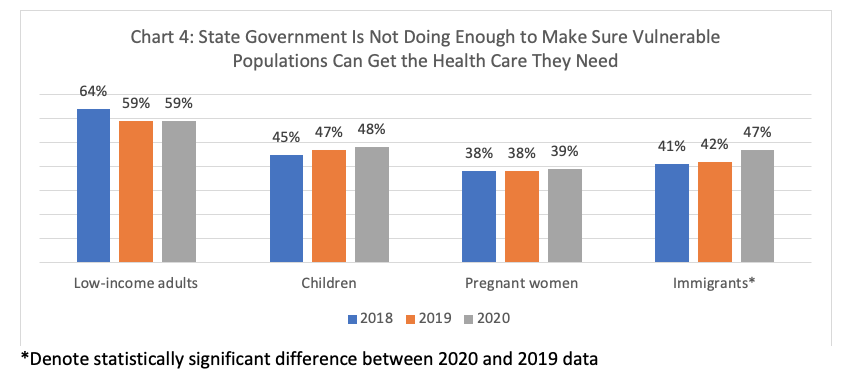
By Shao-Chee Sim
EHF’s VP for Research, Innovation and Evaluation
This post originally was published in Grantmakers in Health’s Views from the Field
EHF recently released the latest Texas Health Policy Poll Report, a statewide public opinion survey that gathers Texans’ opinions on a variety of important state health policy issues. The report marks the third annual release of the statewide poll, with previous polls being conducted in 2018 and 2019. EHF collaborated with Kaiser Family Foundation and SSRS for the 2018 poll. Since then, we’ve collaborated with SSRS for the 2019 and 2020 polls.
Our poll reports have garnered extensive media coverage, were widely shared online, and cited by policy advocacy organizations and policy makers during the legislative session. Considering the devastating impacts of the COVID-19 pandemic, our objective is to continue to use the poll findings to inform the discussion on state health policy priorities.
Given that these polls cover similar questions, this article takes a closer look at the data and trends, comparing the findings in 2020 to those of previous years in which there are statistically significant differences. Polling data over the past three years includes Texans’ views on Medicaid expansion, Texans’ support for increased state government spending on health care, Texans’ top health policy priority for state legislature, and Texans’ view on whether state government is doing enough to make sure vulnerable populations are getting the health care they need.
Increased Texan Support on Medicaid Expansion
As Chart 1 shows, support for Medicaid expansion has increased in the past year. Specifically, we are seeing significant higher percentage of Texans (69 percent in 2020 as compared to 64 percent in both 2019 and 2018) who support the view that the state should expand Medicaid to cover more uninsured Texans.
As one of the 12 states that have not expanded Medicaid under the Affordable Care Act, Texas had the highest uninsured rate (18.4 percent) and the most uninsured residents (5.2 million) in 2019. While the federal government is not expected to release official statistics on uninsured rate until later in 2021, EHF’s COVID-19 poll shows that 8 percent of Texans lost health coverage at some point during the pandemic in 2020. Having health insurance coverage during the pandemic has become even more important for many uninsured Texans.

Increased Support for State Spending on Health Care
Due to the unprecedented health care challenges during the COVID-19 pandemic, we are seeing a slight uptick of Texans supporting increased state spending on health care in 2020 (57 percent) from 2019 (54 percent). However, the difference is not statistically significant (see Chart 2). More importantly, only 9 percent of Texans support decreased state spending on health care in 2020, a figure that is statistically lower than the 13 percent holding this view in 2019.

Health Care Affordability and Access Continue to be Top Priorities for State Legislature
In asking Texans about their top priority for the state legislature, health care affordability and access continue to be key areas of concern. Lowering the cost of prescription drugs and lowering the amount individuals pay for health care have been important issues for 6 in 10 Texans over the past 3 years. A majority of Texans feel the state legislature should address the issues of increasing access to health insurance as well as improving access to hospitals for people in rural areas (see Chart 3). The percentage of Texans who feel the state legislature should address hospital access to rural residents has significantly increased from 46 percent in 2019 to 54 percent in 2020. More than half of Texans would like the state legislature to reduce the number of women who die from causes related to pregnancy and childbirth.

Increased Number of Texans Feel the State Government Is Not Doing Enough to Address Health Care Needs of Immigrant Population
As Chart 4 shows, 59 percent of Texans think the state government is not doing enough to make sure that low-income adults can get the health care they need in 2020. Interestingly, perhaps due to the implmentation of federal Public Charge rule in 2020, 47 percent of Texans now feel the state government is not doing enough to address the health care needs of immigrants, a percentage that is significantly higher than in 2019.

Conclusions
According to latest Census data, Texas had the highest uninsured rate (18.4%) and the greatest number of uninsured residents (5.2 million) in 2019, before the COVID-19 pandemic. Given the unprecedented health and health care challenges confronting Texans relating to the pandemic, our data suggests that more Texans are now supporting increased state government spending in health care, addressing the health care affordability and accessibility, considering the health care needs of vulnerable populations as well as increasing public support for Medicaid expansion.
As a health philanthropy interested to influence state level health policy changes, we see our investment in statewide poll as an important complementary strategy to our existing grant support to health care organizations and policy advocacy organizations. Polling data can be used as an effective tool to generate media coverage, shape community organizing and advocacy campaigns, and generate important public policy discussion to expand health coverage to low-income Americans.